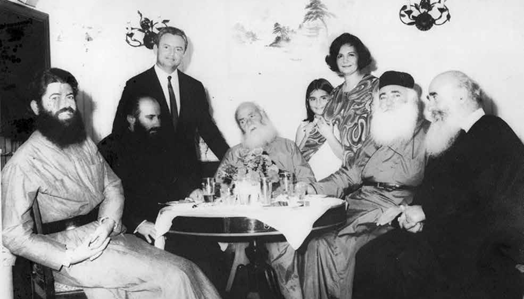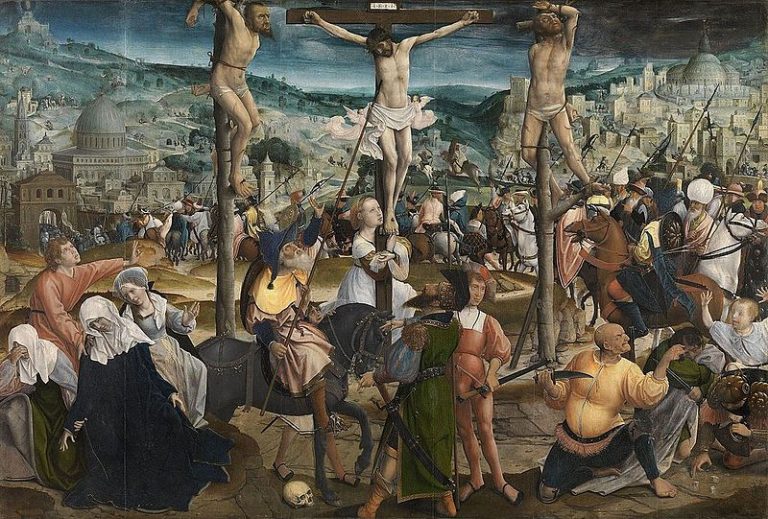Joseph of Arimathea: a Missionary Model
All of the Evangelists, with no exception, mention in their sacred writings the fact of the resurrection of Jesus, who died on purpose and for a limited time. Consequently, they bring out two wonderful figures, Joseph and Nicodemus, shedding light on their charitable, God-loving and merciful deeds, in gratitude and exemplary love – which “casts out fear” (John 4:18) – for their Master and God. In a careful study of the verses devoted to the Lord’s restoration and burial, we observe each Evangelist sketching certain special features of Joseph’s personality, while revealing various information about his social and private life. Joseph was a native of Arimathea, a Jewish town in the Ephraim region
(Stergios Sakkou, Interpretation of the Gospel of Luke, vol. 3, ed. “Christian Elpis”, Thessaloniki 2012, p. 363). He was wealthy according to Matthew and more specifically “an ekklesiastic deputy” (Mark 15:42). The office of “deputy” placed him among the members of the Great Council of the Jews, while the designation “ekklesiastic” indicates a pious and prudent man. Luke calls him a man “good and righteous” (Luke 23:50), traits demonstrated by his attitude; when the Congress of the Jews unjustly condemned Jesus, “he did not consent to their counsel and deed” (Luke 23:51). He was a “hidden” disciple of the Nazarene, according to John, “for fear of the Jews” (John 19:38). St. Chrysostom speculates that he belonged to the group of seventy (John Chrysostomos, Sermon, S.P.E., vol. 14, ed. “Gregorios Palamas”, Thessaloniki 1981, p. 678). We can even speculate that he was among the fervent disciples, since “he also prayed for the kingdom of God” (Luke 23:51).
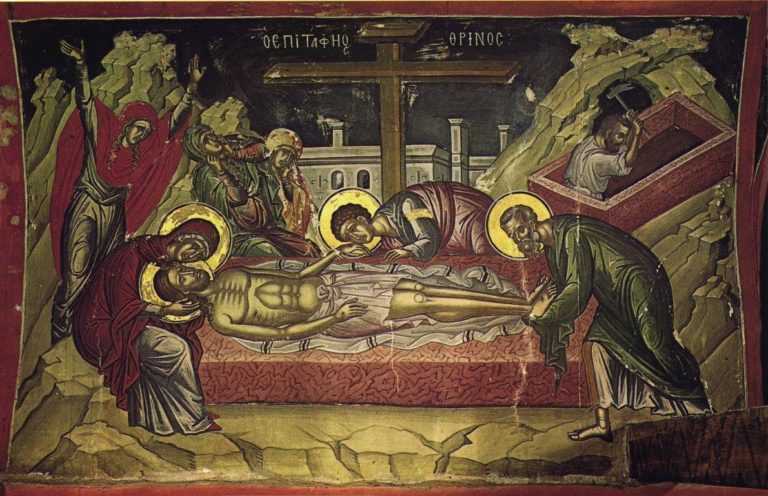
As long as the Savior’s sufferings lasted, he discreetly stood by his Master with pain of soul and filial love. Every scourging Jesus endured tore His own being, the vinegar He was drenched in bittered His own lips as well. The emotion, the holy indignation that rose up in his soul because of the unspeakable injustice against his spiritual Father, the sorrow that overcame him at the sight of the Passion, as well as the events “the signs” which followed after the death of Athanathus led Joseph without any inhibition, without any fainting, to the brave decision; “he dared to introduce to Pilate, and he took the body of Jesus” (Mark. 15:43). Going deeper into his movement, St. Chrysostom comments:
“This is Joseph who was previously in hiding. But now after the death of Christ he showed great boldness. For he was neither insignificant, nor of those who remain unnoticed, but one of the members of the Congress and very illustrious. From this indeed his valour is clearly shown. For he condemned himself to death when he proclaimed his abhorrence of all with his sympathy for Jesus, and dared to ask for His body, and did not depart until he had accomplished what he wanted.”
(Ioannou Chrysostomou, Sermon PH, H.P.E., vol. 12, “Gregorios Palamas”, Thessaloniki 1981, p. 353). Pilate consents to his request and gives him what he desires. Joseph carries the long-suffering Sacred Body, prompting St. Epiphanius to exclaim:
“I bless your hands, Joseph, which served and felt the God-given hands and feet of Jesus, which were still dripping blood. I bless your hands, who touched the bleeding side of God before the faithful – unbelieving Thomas who had commendable curiosity. I bless your mouth that filled voraciously and embraced the mouth of Jesus and from there filled with the Holy Spirit. I bless your eyes that joined with the eyes of Jesus, and from there they received true light. I bless your face that drew near to the face of God. I bless your shoulders that lifted up the One who bears all. I bless your head that Jesus, the head of all, touched. I bless your hands in which you have placed the One who bears all things. I bless Joseph and Nicodemus, because they became Cherubim before the Cherubim by lifting up and carrying God upon them.” (From the Diakonema)
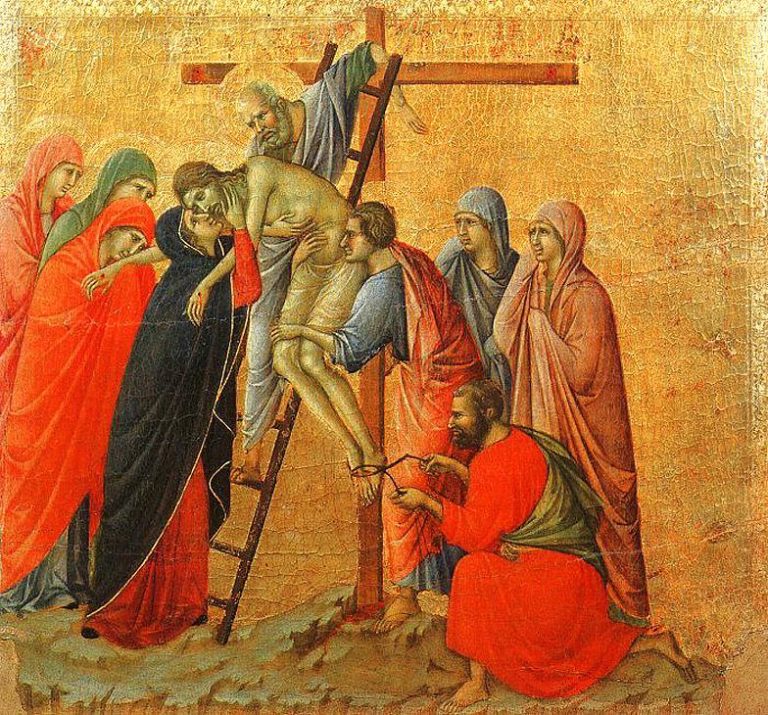
But Joseph’s philanthropy does not end here. He gives the tomb, his own, the carved, uninhabited, new tomb, to Jesus. He buries Him with all the solemnity of Jewish tradition, wraps Him in new shrouds and anoints Him with expensive perfumes offered by Nicodemus (John 19:39). What is incomprehensible – and yet miraculous – is that he takes all these actions in the certainty that he is tending a dead man who will not rise – his Master, whom he certainly loved, but whom he “deceived”. He promised him that he would rise from the dead and now he lies dead in his arms, having suffered the most ignominious death. Dead are Joseph’s hopes, as well as those of the rest of the disappointed and frightened disciples. But his exemplary devotion rises to a level comparable to that of the brave myrrh-bearers. He risks wealth, career, perhaps even his own life to pay a few hours’ honour to his dead Master, to minister to the One to whom he devoted all the fire of his heart. And his Risen Lord of Hearts willed, in spite of his unbelief, to record four times this leap of Joseph’s love in His inspired book, that it might not be forgotten for ages. After Christ’s glorious resurrection, St. Joseph “spent” the rest of his life, like the rest of His disciples, preaching the Gospel to the Gentiles. According to tradition – without being absolutely certain – the Saint headed for England, where he worked as a missionary until his peaceful death. His memory is commemorated on 31 July each year and on Myrrh Sunday, two weeks after Easter.
Apolytikon
Voice b
O merciful Joseph, from the wood of every man thy immeasurable body, Thou hast spoken a synnaton and perfume, in the memory of all I burn, Thou hast buried it: but three days hast thou risen, O Lord, who givest the world great mercy.
Wealth and Mission
From the incident of Jesus’ restoration and burial, Joseph’s attitude leads us to instructive conclusions about mission. According to St. Chrysostom, “Rich is not he who is bound with much money and clothed with many things, but he who has need of nothing.”
(Venedictus Ieromonachos, Chrysostomic Fund, published by the Synod of Spyridon Ieromanachos, Mount Athos 2002, p. 842). Such was Joseph; he had riches, but he was free from any kind of attachment to them. Thus, when his conscience cried out about the gross injustice suffered by his Master, he was diligent and loving, and acted as a minister to the Crucified One, even though he risked being deprived of his riches by revealing his devotion to Him. In addition, the Holy Father points out: ‘Rich is not the man who has acquired much, but the man who teaches much’. (Venedictus Ieromonachos, Chrysostomic Fund, published by the Synod of Spyridon Ieromanachos, Mount Athos 2002, p. 843)∙ And Joseph offered to the Lord the synnon, the hewn tomb. The best that he had at that time he gave to Tu. It is true that rich people are needed in the vineyard of the missionary field; but rich people with a generous heart, charitable and merciful, unable to justify or camouflage the inequality against the people – and especially the little children – of the so-called Third World; rich people with a heart of “sharing” and not of “collecting”, who are at peace and rejoice when they comfort the pain and suffering of others.
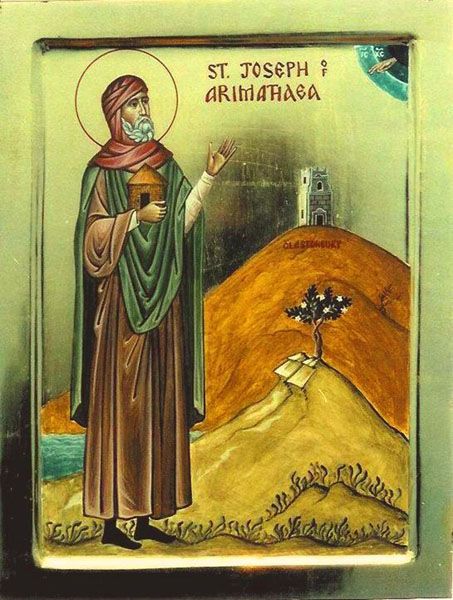
Joseph dared, took risks… and probably lost money, property and offices, but he exchanged them for eternity… The poet (Andreas Kalvos) says: “Freedom needs virtue and courage”. And he is right! To paraphrase the phrase a little, we exclaim: Yes! Ω! Yes! Freedom in Christ, freedom in Christ, life in Christ, the missionary way of life, requires virtue and courage! Joseph was not free when he thought about his possessions, his social profile and the world; he moved under “the fear of the Jews”. But when he dared, he was set free… He had virtue, he was good and righteous. He had boldness. In these things we fall short today as we interrupt the work of the mission. Many have the qualities and virtue, but sadly they fall short in boldness, courage, spirit of sacrifice and Christian courage. Others who dare, fall short in virtue, in practice and in life in Christ.
Asking for the intercessions of St. Joseph of Arimathea and having him as our model, let us cultivate virtue and dare for Christ, never forgetting that… “mission requires virtue and daring!”

